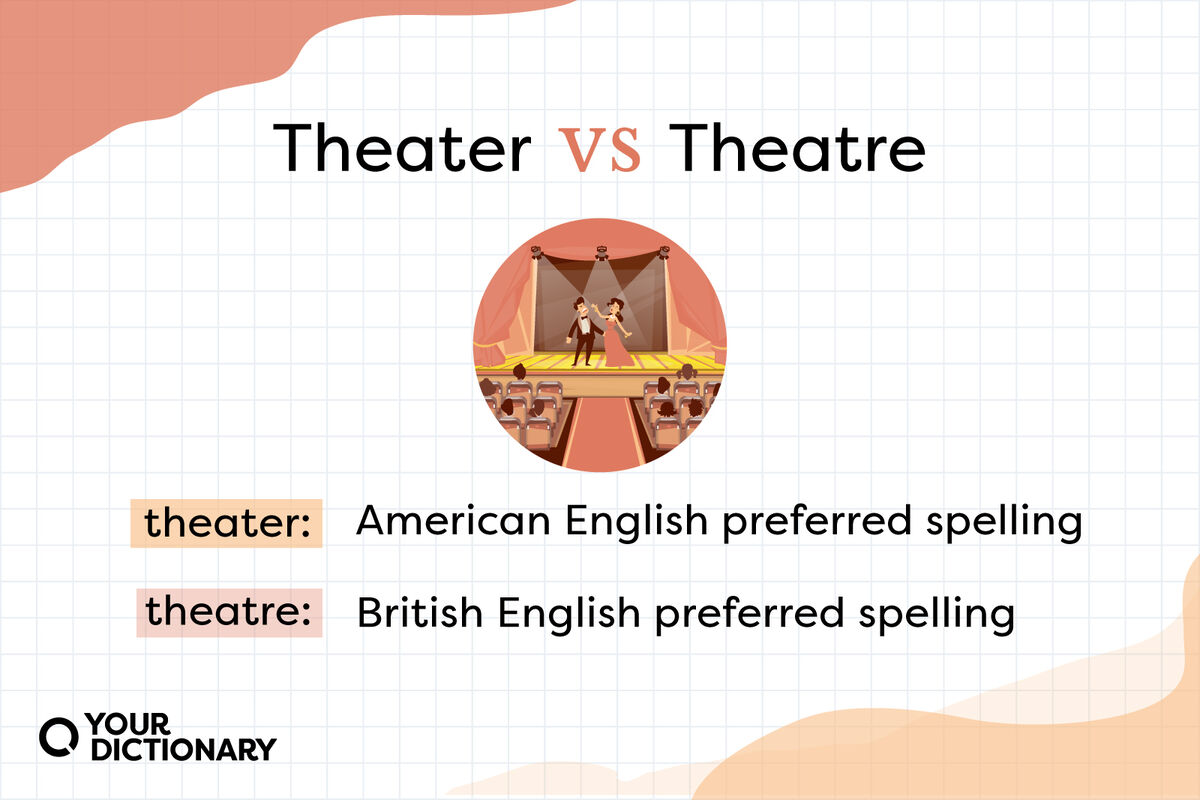
Nothing beats a bag of popcorn covered in a butter-flavored topping, cushy seats, and a giant screen showing your favorite movie. We all know that sticky floors coated in centuries of candy and spilled soda are part of the modern theater experience. Unless you’re used to British English, in which case it’s the theatre experience, and it might not be the same thing that you’re thinking of.
Which Is Correct: “Theatre” or “Theater”?
Both theatre and theater are different spellings of the same word. Theater happens to be favored by people who use American English.
Theatre is more common among British English speakers, which includes Canadians, Australians, and people in the U.K. Essentially, if you’re outside of the United States, you’re more likely to see theatre.
How To Pronounce “Theatre” and “Theater”
Despite the rearrangement of the “E” and the “R,” theatre and theater are both generally pronounced the same way: “THEE-uh-ter.” However, that pronunciation can vary within regions as well.
In American English, some people will swallow that second syllable, giving a pronunciation closer to “THEE-ter” or “THEE-der”
Other people (both British English and American English users) may accentuate that second syllable, giving you “THEE-ay-ter” or “THEE-ay-der”. They may also place an accent on that second syllable, giving you “thee-AY-der”.
That can understandably be confusing, considering you have words like eater (ee-ter) and eggbeater (egg-bee-ter) that look like they should rhyme with theater.
How To Use “Theatre” and “Theater”
If you use British English or you’re writing somewhere other than the U.S., you should stick with theatre.
In the U.S., you should almost always use theater in your writing. However, there are numerous theaters, usually of the smaller, independent variety, that use theatre in their name. In that case, refer to that specific venue by their chosen name.
- AMC Theatres (global chain)
- Grauman’s Chinese Theatre (Los Angeles, CA)
- El Capitan Theatre (Los Angeles, CA)
- Hollywood Theatre (Portland, OR)
- Laurelhurst Theater (Portland, OR)
- The Midland Theatre (Kansas City, MO)
- Gramercy Theatre (New York, NY)
- Paris Theater (New York, NY)
Interestingly, the internet seems to prefer theater over theatre.
What Do “Theatre” and “Theater” Mean?
Theatre and theater are nouns that initially referred to large, open-air facilities designed for viewing plays and other spectacles. Most modern theaters have done away with the open-air feature, but they otherwise serve the same purpose, including stage entertainment and movies.
- The movie theatre was packed for the new superhero war rom-com movie.
- I was looking forward to intermission to stretch my legs and explore a bit of the theater.
Theatre and theater can also refer to the dramatic arts in general or the theatrical profession.
- Theatre can come with a whole host of difficulties beyond just trying to remember lines.
- I’m glad to have other friends in theater who I can commiserate with.
Word Origins of “Theatre” and “Theater”
Theater and theatre originate from French theatre and Latin theatrum, referring to a venue that showed plays, a stage, or the spectators in the theater. The Greek root is theasthai, meaning “to behold.”
Interestingly, most all other Romance languages also place the “R” before the vowel, as in Italian teatro and Portuguese theatro.
The Real Differences Between the Theatre, Theater, and Cinema
One confusing usage problem with theatre and theater is that it can refer to both stage plays and the place where movies get shown. That can be troublesome when someone says, “Hey, let’s go to the theater/theatre,” and you’re prepared to watch the next great action movie but end up sitting through a live stage performance of Waiting for Godot.
“Movie Theater” or “Movie Theatre"
To differentiate, both American and British English users might attach the word movie before theater or theatre, so you get something more specific, like “Let’s go to the movie theater.”
The Cinema
British English also goes a step further with the word cinema. Cinema in American English can refer to movies in general, but British English also uses cinema to refer to a building or venue where movies are shown. So someone might say, “Let’s go to the cinema,” to watch a movie, as opposed to “Let’s go to the theatre” to watch a live stage play.
British English vs. American English: Words Ending in -er
Theatre and theater aren’t the only words that flip the last two letters between British and American English. You can see that change from -re to -er in words like fiber, center, and liter, which are spelled fibre, centre, and litre in British English.
That change is believed to have come in the late 18th century as a means of differentiating American English from British English. Interestingly, you can still see remnants of those British spellings in words like ogre and acre.